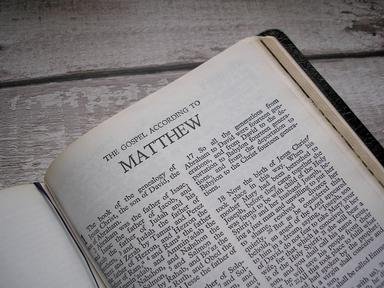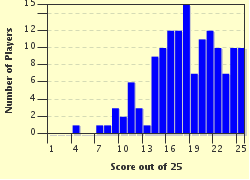Quiz Answer Key and Fun Facts
1. The letter 'A' is for 'Approval'. According to the Gospel of Matthew, a leader of the day who gave approval to demands to crucify Christ was told just beforehand by his wife to have "nothing to do" with Jesus. Who was the leader, as per Matthew 27:19?
2. The letter 'B' is for 'Beatitudes'. Complete the missing word for this verse found in the Beatitudes of the Gospel of Matthew, as per the New King James Version Bible:
"Blessed are those who mourn
for they shall be _________."
(Matthew 5:4)
3. The letter 'C' is for 'Centurion'. The Gospel of Matthew tells of a centurion approaching Jesus and asking him to heal his servant who was "paralyzed" and "dreadfully tormented". What was unusual about the incident? (Matthew 8:5-13)
4. The letter 'D' is for 'Dream'. According to the Gospel of Matthew, what recently married man was told in a dream to flee with his family to Egypt? (Matthew 2:13-15)
5. The letter 'E' is for 'Egypt'. The Gospel of Matthew is the only Gospel in the New Testament telling of Joseph and Mary and infant Jesus going to Egypt.
6. The letter 'F' is for 'First'. After Matthew became a disciple of Christ, what, according to the Gospel of Matthew, was the first thing he did? (Matthew 9:9-13)
7. The letter 'G' is for the 'Great Commission' as found in the Gospel of Matthew 28:18-20. What exactly is the 'Great Commission'?
8. The letter 'H' is for 'Hairs Numbered'. In the Gospel of Matthew, Jesus is quoted as saying the "very hairs of your head are all numbered". Christ then goes on to make a point. What is the point He makes? (Matthew 10:27-30)
9. The letter 'I' is for 'Immanuel'. In the New Testament, the name Immanuel is found in only the Gospel of Matthew and it's used to identify Jesus. According to Matthew 1:23, what does Immanuel mean?
10. The letter 'J' is for 'Jesus'. The Gospel of Matthew tells of one specific event during the crucifixion of Jesus that is not recorded in the other Gospels. Out of the four events listed below, what one is mentioned in only Matthew?
11. The letter 'K' is for 'Kill'. The Gospel of Matthew tells of a diabolical edict by Herod to kill all the male children in Bethlehem under a certain age? What was the age for children to be killed? (NKJV)
12. The letter 'L'. Matthew, the disciple credited with writing the Gospel of Matthew, was known by a second name that starts with the letter 'L'. What was the name?
13. The letter 'M' is for 'Miracles'. Out of the miracles listed below, what one is found in only the Gospel of Matthew?
14. The letter 'N' is for 'New Testament'. In the order books appear in the New Testament, where does the Gospel of Matthew appear?
15. The letter 'O' is for 'Occupation'. Going by tradition, what occupation did the writer of the Gospel of Matthew work at before he became one of the Twelve Disciples?
16. The letter 'P' is for 'Parable'. Out of the four parables below, what one appears in only the Gospel of Matthew and no where else?
17. The letter 'Q' is for 'Queen' as in 'Queen of the South', found in only the Gospels of Matthew and Luke. On the surface, the Queen of the South is none other than the Queen of Sheba who visited Solomon. However, many theologians, including the study notes of the New King James Version Study Bible, suggest the 'Queen of the South' represents Gentile believers. (Matthew 12:38-42)
18. The letter 'R' is for 'Rust'. In the entire New King James Version Bible, the word 'rust' appears twice and both instances are in the Gospel of Matthew. Jesus is quoted in Matthew 6:19 as saying "Do not lay up for yourselves treasures on earth, where moth and rust destroy and where thieves break in and steal." What does the next verse say, in part?
19. The letter 'S' is for 'Sermon on the Mount' and 'Shorthand'. Because Matthew took such detailed notes during Christ's Sermon on the Mount, many theologians believe he knew shorthand.
20. The letter 'T' is for 'Temptations'. According to the Gospel of Matthew, how many temptations did Jesus face when He was visited by the devil in the wilderness? (Matthew 4:1-11, NKJV)
21. The letter 'U' is for 'Unjust', The following verses from Matthew 5:44-45 quote Jesus and contain the word 'unjust': "But I say to you, love your enemies, bless those who curse you, do good to those who hate you, and pray for those who spitefully use you and persecute you, that you may be sons of your Father in heaven; for He makes His sun rise on the evil and on the good, and sends rain on the just and on the unjust." Where did Jesus make this statement?
22. The letter 'V' is for 'Virgins'. The Parable of the Wise and Foolish Virgins is told in only the Gospel of Matthew. According to Matthew 25:1-13, what attribute did the wise virgins have?
23. The letter 'W' is for 'Women'. In the genealogy of Christ, the Gospel of Matthew makes mention directly and indirectly of four different women. Who are they? (Matthew 1:1-16)
24. The letters 'X' and 'Y' are for 'Yoke'. The following, verses, containing the word 'yoke' are from the Gospel of Matthew: "Come to Me, all you who labor and are heavy laden, and I will give you rest. Take My yoke upon you and learn from Me, for I am gentle and lowly in heart, and you will find rest for your souls. For My yoke is easy and My burden is light." Whereabouts in Matthew do you find these verses?
25. The letter 'Z' is for 'Zion' and 'Zechariah'. In the NKJV, the word 'Zion' is found only twice in the four Gospels and one of the occurrences is Matthew 21:5. The verse, quoting Old Testament Scripture, states:
"Tell the daughter of Zion,
'Behold, your King is coming to you,
Lowly, and sitting on a donkey,
A colt, the foal of a donkey."
The verse in question is from Zechariah 9:9. (NKJV)
Source: Author
Cowrofl
This quiz was reviewed by FunTrivia editor
agony before going online.
Any errors found in FunTrivia content are routinely corrected through our feedback system.

